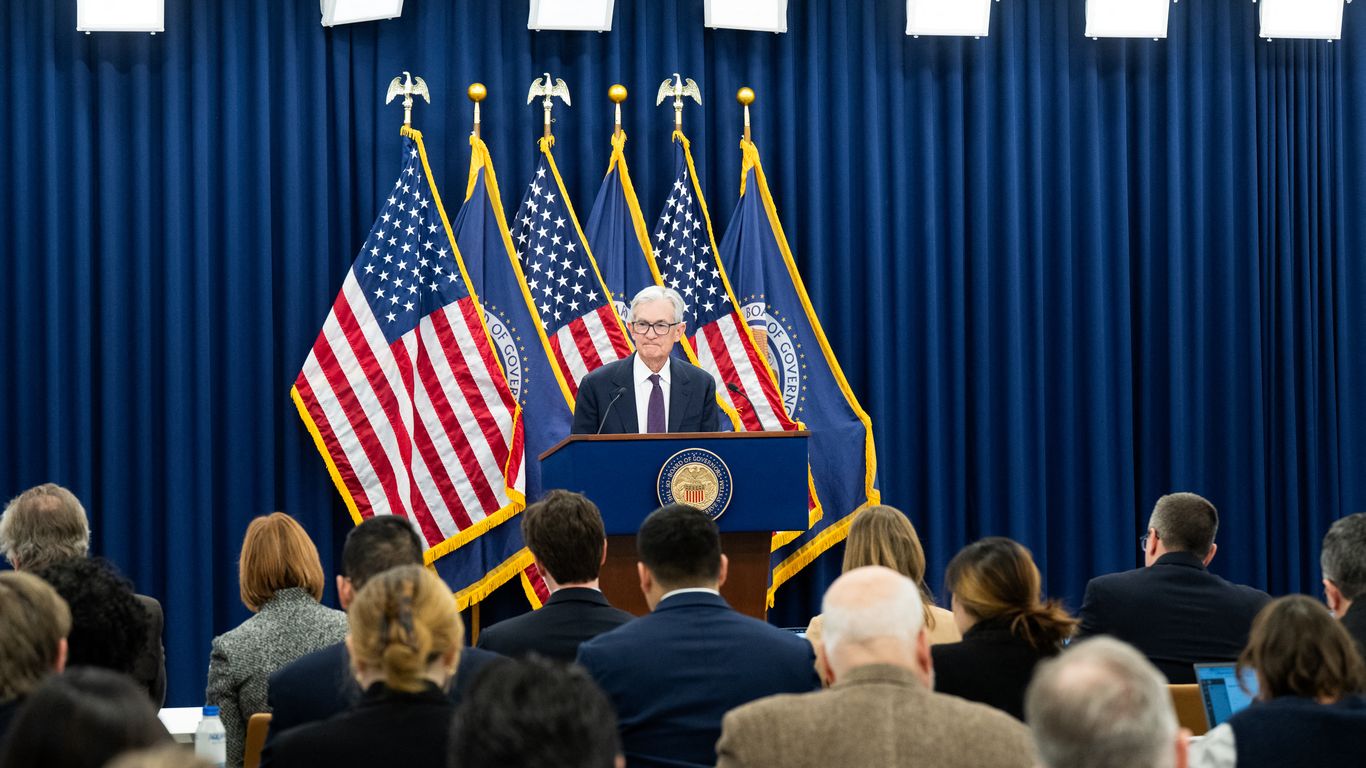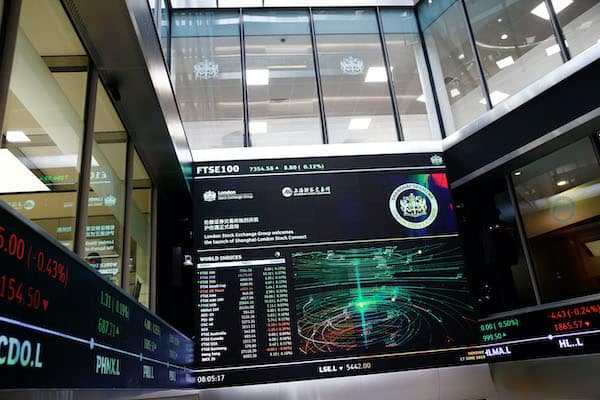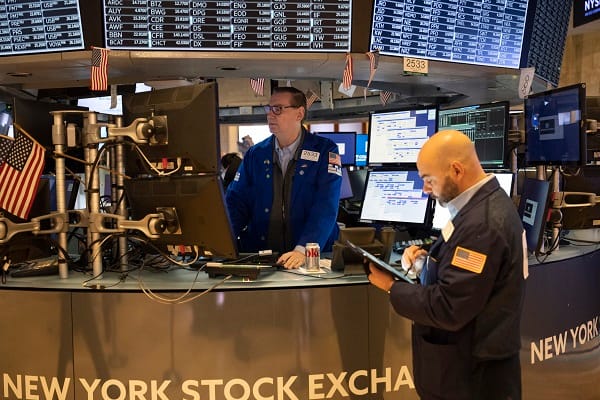#federal-reserve
#federal-reserve
[ follow ]
#kevin-warsh #interest-rates #monetary-policy #inflation #us-dollar #fed-independence #labor-market #gold #bitcoin
US politics
fromFortune
3 days agoJerome Powell knows the Fed's balance sheet got too big-Kevin Warsh has a plan, he just has to sell it without freaking out markets or the Treasury | Fortune
Powell sustained large Fed debt purchases supporting federal borrowing; Warsh seeks a smaller balance sheet, which could raise yields and increase Treasury borrowing costs.
Business
fromFortune
4 days agoFed staff are more worried about stock prices than tech debt, even as hyperscalers go on a borrowing binge for their AI spending | Fortune
Tech companies' heavy bond issuance raises Wall Street concern, but Fed staff view nonfinancial corporate vulnerabilities as moderate while flagging elevated asset valuations.
fromFortune
5 days agoFed confirms it obeyed White House request for an unusual 'rate check,' weakening the dollar against foreign currencies | Fortune
The U.S. Federal Reserve confirmed yesterday that its trading desk did conduct a rare "rate check" on the exchange rate between the U.S. dollar and the Japanese yen on behalf of the White House earlier this year. The move is often regarded as a precursor to actively intervening in currency markets. In this case the implication would be that the U.S. Treasury wanted to strengthen the yen versus the dollar (or, vice versa, weaken the dollar versus the yen).
US politics
US politics
fromAbove the Law
5 days agoStock Traders Are No Longer Taking Employment And Inflation Data From The Trump Administration At Face Value - Above the Law
Donald Trump attacks and reshapes federal economic institutions and data production to favor flattering statistics, undermining credibility of official economic reports.
US politics
fromFortune
1 week agoJerome Powell is facing a 'puzzlement' of economic data, with contradictions likely to freeze any immediate action on the base rate | Fortune
A stronger-than-expected January jobs report sharply reduced odds of a March rate cut, increasing the likelihood the Fed will hold rates to meet its inflation and employment mandates.
US Elections
fromFortune
1 week agoWe've probably already seen 'Peak Trump,' says PIMCO, with the Oval Office now constrained by courts and midterms | Fortune
Trump's political influence has peaked, facing legal, institutional, and electoral constraints that may limit policy implementation and affect markets and midterm strategies.
fromwww.housingwire.com
1 week agoU.S. labor market gains 130,000 jobs in January as unemployment falls
Unemployment remained little changed from December, falling slightly to 4.3% with 7.4 million people unemployed. Both of these figures are higher than they were a year ago, when the jobless rate was 4.0%, and the number of unemployed people was 6.9 million. The jobs report beat estimates; the unemployment rate fell, and the internals of the report were fine too.
US news
US politics
fromAdvocate.com
2 weeks agoScott Bessent struggles under questioning by New York Rep. Ritchie Torres during explosive House hearing
Representative Ritchie Torres pressed Treasury Secretary Scott Bessent on presidential authority to remove Federal Reserve officials, revealing administration evasions and raising questions about Fed independence.
fromLondon Business News | Londonlovesbusiness.com
3 weeks agoDollar struggle and monetary policy shape the next phase - London Business News | Londonlovesbusiness.com
The resilience of gold above $4,800 per ounce at this stage reflects a delicate and complex balance between traditional supporting factors and emerging pressures-one that cannot be superficially interpreted or reduced to the movement of the dollar alone. It is true that the U.S. dollar's retreat from its recent peaks, after failing to sustain its recovery momentum from a four-year low, provided gold with a short-term breather and attracted some buyers.
Business
fromFortune
3 weeks agoKevin Warsh will inherit a challenge no Fed chief has faced since post-World War II | Fortune
The newly-named Federal Reserve chairman faces an historic challenge that no predecessor has encountered since the years immediately following World War II. In that period, the gigantic spending required to aid our allies and secure military victory saddled the U.S. with towering debt. President Truman-fearing that huge interest costs would swamp the budget-heavily pressured the Fed to hold down rates. Today, the U.S. is wrestling with its biggest budget crisis in 70 years, and we're confronting a similar conundrum.
US politics
fromAxios
3 weeks agoWhy Wall Street is unhappy with Trump's pick for Fed chair
Dutta tells Axios: "I don't think people should change their investment plans around Warsh. The Fed is bigger than any one person. At the margin, Warsh represents a bit of uncertainty." One concern is that Warsh will cut interest rates now to appease Trump even if lower rates aren't warranted, which could result in the need for increases later on.
Business
fromFortune
3 weeks agoRight before Trump named Warsh to lead the Fed, Powell seemed to respond to some of his biggest complaints about the central bank | Fortune
"It's easy to criticize government institutions in so many ways," he said. "I will tell whoever it is: You're about to meet the most qualified group of people you not only have ever worked with-you will ever work with-when you meet Fed staff. And not everybody's perfect, but there isn't a better cadre of professionals who are more dedicated to the public well-being than work at the Fed."
US politics
US politics
fromFortune
3 weeks agoAnother 'central casting' central banker: Trump's pick of Kevin Warsh fits a well-established pattern | Fortune
President Trump prioritizes performative fit and public image when selecting senior officials, emphasizing appearance and stage presence for Federal Reserve leadership.
fromwww.housingwire.com
3 weeks agoWarsh's Fed chair term brings new uncertainty for housing market
Warsh previously served as a Fed governor from 2006 to 2011 and is currently a partner at Duquesne Family Office alongside Stanley Druckenmiller. He is also a visiting fellow in economics at Stanford University's Hoover Institution. Warsh still could face a tough Senate confirmation after the Justice Department issued grand jury subpoenas as part of a probe into Powell, sparking bipartisan criticism.
US politics
US politics
fromFortune
3 weeks agoKevin Warsh went from selling racetrack pencils to Trump's new Fed chair pick. His advice for Gen Z: merit is the ultimate currency in the workplace | Fortune
Kevin Warsh attributes his work ethic and leadership lessons to early racetrack jobs and emphasizes merit, humility, and contribution over title.
Business
fromLondon Business News | Londonlovesbusiness.com
3 weeks agoGold declined amid Federal Reserve nomination expectations - London Business News | Londonlovesbusiness.com
Gold pulled back toward USD 5,000 as investors reassessed ahead of the expected Fed chair announcement, yet remains on track for weekly and monthly gains.
Business
from24/7 Wall St.
3 weeks agoHere Are Thursday's Top Wall Street Analyst Research Calls: Agnico Eagle, First Solar, Fortinet, General Motors, NVR, StoneCo, Werner Enterprises, Zillow, and More
U.S. markets closed mixed after the Federal Reserve held rates; Treasury yields rose and oil rallied amid Middle East tensions and weather-related production disruptions.
[ Load more ]






























